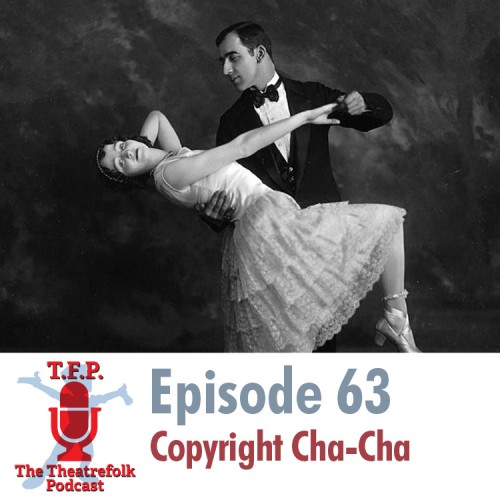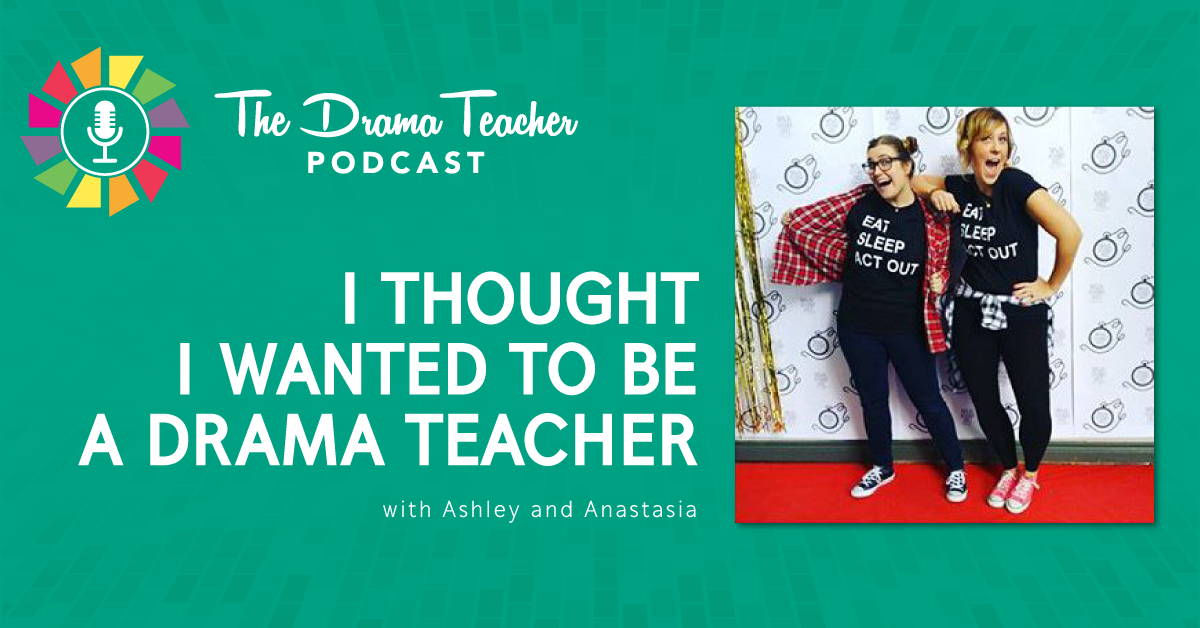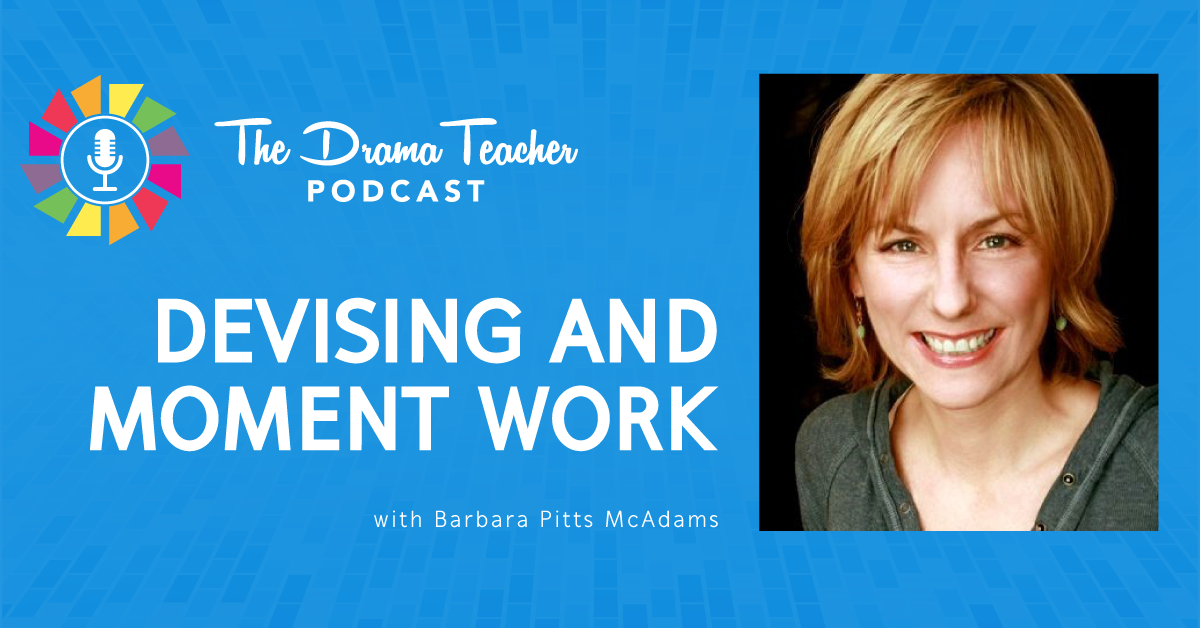Theatrical Copyright Cha Cha Cha: Copyright for Beginners
Episode 63: Theatrical Copyright Cha Cha Cha: Copyright for Beginners
Today Lindsay goes through the twists and turns of copyright that every beginning drama teacher and more importantly every drama student should know. Comes with a Copyright Quiz!
Show Notes
Download the free Copyright Quiz mentioned in the podcast.
Subscribe to The Theatrefolk Podcast
Episode Transcript
Welcome to TFP, The Theatrefolk Podcast. I am Lindsay Price, resident playwright for Theatrefolk. Hello, I hope you’re well. Thanks for listening.
So, it was just Thanksgiving weekend here in Canada and, even though Craig and I don’t eat meat or dairy, that did not mean that we did not have a stomach-stretching feast! Oh, it was so good! And, even though it’s something we should do every day, Thanksgiving is a good time to reflect on what we’re thankful for. We’re very thankful to have a roof over our heads and good health – not just for ourselves but within our family. We’re happy to be able to continue working at what we love and with each other. A lot of people ask Craig and I how on earth are we not only able to work together but spend all day together – everyday together. I hate to be all mushy but we get very cranky when we’re apart.
And, lastly, we’re thankful for all of you out there, and I don’t hate to be mushy when I say that we love our customers. Stay tuned. At the end of the podcast, you hear about something we’re so thrilled and grateful to have received from a group of customers. You guys are the best folks and, well, we’re really proud to be part of your community – except for those of you who ignore copyright laws, or purposefully fail to educate yourself on copyright law. I couldn’t figure out a way to do that! That was by far the weirdest and awkwardest segue ever – “We love you! We’re so happy to be part of your community! Bad teachers who violate copyright law! Bad teacher!”
As you may have guessed, so, copyright is the topic of the podcast today and, you know, it’s a topic in the theatrical world – whether you’re a professional or an amateur, you’re doing a community production or a school production. It’s something where everybody falls under the same rules. Plays are protected by copyright but there’s a lot of people out there who have no idea what that means.
We get calls from people, all the time, who have sort of been flung into the role of director and don’t know what it means to get permission to perform a play or copy a play and why would they have no idea that you need a royalty to perform them? I have adults who have no idea that, when you go to see a play, that that production had to, you know, basically rent the play.
And, you know, same thing with changes. Teachers contact me and tell me about the changes they’ve made to one of my scripts because they were sure that I wouldn’t mind. Well, you know, you can’t do that. And, I have to tell you, just on a purely personal level, when someone changes one of my plays because they think I wouldn’t mind, that kills a little piece of my soul inside. Yup, if you change my script without asking because you think it doesn’t matter because I wouldn’t care, a piece of my soul dies – that’s what you’re responsible for, just so you know.
But, you know, it’s not even just people putting on plays or people going to see plays, it’s playwrights too! There are playwrights who have no idea or are confused about copyright. “How do I copyright my play?” “What does that mean?” “Do I have to register my play?” “If I’m signing a publishing contract, does that sign my copy right away?”
Okay. So, today I’m going to go in this podcast over copyright on both sides of the fence. And, let’s be frank, this is a podcast for the beginners, if you don’t know. You know, if you’re a beginning playwright: what do you have to do to copyright your work? If you’re a beginning teacher: what do you have to do to follow copyright law? And, really, most importantly, what can you do to teach your students about copyright law? I will be really great, at the end of this sentence, if you played this podcast for your students, I’m going to include a quiz at the end – a quiz – I’m going to include a quiz at the end so that, teachers, you can play parts of this podcast for your students and then assess what they retain. What do they retain about copyright law? Okay. So, here we go.
What is copyright? So, someone who has copyright – let’s say, in this case, a play – that means that they own that material. Think of it like owning a house. So, the playwright owns the play, they make the decision as to who can do the play or not do the play. And, as the owner of the play, they get a fee for a performance. Just like, if you’re the owner of a house and you’re going to rent it out, you get a fee from the rentee. Royalty is like rent.
And, the owner of the play – under a copyright, because they own it – the owner of the play, the playwright, also decides what changes can be made to the play and what cannot be done to the play – you know, same as a house owner. So, if you want a house, you can make changes to your house – whatever you want, you own it. But Joe Blow off the street can’t come into your house and start knocking walls down, right? So, if you’re the owner of the house and you want to have someone come in and say, you know, paint or add an addition, you have a say as to who that is. You know, you have a say in what your house looks like.
This notion of change gets really askew when it comes to plays. There is this notion that, particularly with, well, with music too and with plays that they are malleable – that they’re changeable to whomever is putting them up. But you are not the owner, right? When you’re putting up a play, you don’t own the play. You’re not buying the play. You’re not buying the house, right? You’re only renting. So, you can’t rent a house for free so why would you expect to put a play on for free, right? You don’t own it; you’re renting it. You can’t change the house so why would it be okay to change the play? Really think about it in those terms. If you look at the play as a house, what could you do to a house? Same thing. You couldn’t come in off the street and change a house. You can’t, when you’re putting up a play, just change it willy-nilly. Renting, not owning.
Now, let’s look at the specifics of the work, the play, right? The house, what the house is.
So, if you’re a playwright so here’s what you can’t copyright. You cannot copyright a title. You can’t copyright an idea. So, if you’ve got an idea and it’s, you know, swimming around your brain, something that you’re thinking about, you’re thinking about writing it down, you cannot own that idea. To own your work, it has to exist. It has to be somewhere. So, what that means is that you can copyright the application of an idea. So, once it goes down on the page, you own it. You own the copyright of that work.
And, you know, there are those that say you have to have more proof of copyright – that you have to register the copyright with the copyright office, or you have to send a copy of the script to yourself via registered mail, and that’s the only thing that makes it legally binding. If that makes you feel better, fine, do it. But, by law, it’s not necessary. You don’t even have to put the copyright symbol on your title page now, these days, and your work doesn’t even have to be published. It’s the existence of the work that makes it something that you own. Once the play exists, just like once the house is built, you own the copyright.
And, here’s an important side note. This is particularly, now that we’re dealing with the Internet and what is usable on the Internet and how do we use things on the Internet, to have a piece on the web is an application, right? So, if a piece of work is published on the web, that means it exists. So, it’s not an idea, all right? It’s not floating around in somebody’s head. It’s been applied, and that means it’s under copyright. So, work that is published on the Internet is not free for anyone to use however they want. So, meaning that it’s not changeable. You can’t just take a play that you found on the Internet and do whatever you want to it.
Also, speaking of publishing and producing, as a playwright, if you are entering into a contract, the one thing that you do not want to see on that contract is wording where you give up your copyright – where the publisher or the producer is trying to say that they own the play, and that, if you sign the contract, that they own it. If you see wording like that, it is not worth it. Walk away immediately because what the publisher or producer wants is, well, they want to own it. They want to buy the house. They want to be able to make changes without consulting you. They want to take you out of the picture.
With Theaterfolk contracts, what our authors are doing is they’re giving us the right to act as an agent, basically. We can sell the plays but we don’t have any say in changing the content without discussing it with the playwright. The playwright is part of the conversation, you know? We can’t change the house.
And, what is so interesting to me is that, if you’re a screenwriter, the notion of owning copyright does not exist. It goes out the window. You know, once your screenplay goes into production, it seems that everyone and their dog can change your script – from the producer, to the director, to the actor. You know, the writer is definitely the low man on the totem pole. And, rightly or wrongly, it’s one of the hugest reasons that I’m not interested in writing film, that I don’t want to be a screenwriter, because I don’t get it. I’m not interested in pouring myself into a work which is, you know, it’s what I do. I love to write and the thought of someone coming along and just going, “Well, this character, we don’t like this character,” “Oh, we have to change location,” “Oh, this actor doesn’t like this line, it doesn’t make them look good, “and that they can just go ahead and make those changes without ever consulting me, you, well, it freaks me out. It’s not something I’m ever interested in. People have asked me that, “Why don’t you want to go into movies?” It’s like, “No. No. No, never. Nope. Not going to do it.”
So, now, what about public domain? What does that mean? That’s a phrase that gets floated about and what that means is that, if a work is in the public domain, that the work is not under those copyright laws. In most cases, it was written before copyright law came into place. So, the same rules about a modern play don’t necessarily apply. You can change Shakespeare, for example. Shakespeare was written way before there was a copyright law in existence. It’s not something that is. So, even though Shakespeare is an application, right? It’s a play, it’s published, it’s on the page, but it was written before laws were enforced. So, you can change Shakespeare and you can put it up without having to pay a royalty.
You can put up a Greek play without having to pay a royalty and you can change that, but you really want to be careful with plays that originally were in another language. So, if you’re got a Greek play, if you’ve got something from Oedipus Rex from Sophocles, that’s a translation and, if the translation was written after copyright law went into effect, that translation is the application. So, that translation is under copyright. So, for example, there is a translation of Oedipus Rex by a guy named Robert Fagles – Fagles? Wow, did I probably just really murder that name! Okay. So, anyway, he wrote a translation of Oedipus Rex in the eighties, right? So, after copyright law went into effect, so even though he’s using public domain work, his translation is under copyright. His translation is the application. You just can’t take his translation and do whatever you want with it, okay? For the most part, works written before 1923 – that’s the magic year – are considered in the public domain.
Next question, what is the shelf-life of copyright? That depends. It’s changed over the years. There was a time in the first half of the 20th century where you had to renew copyright. For many years, the movie “It’s a Wonderful Life” was actually in the public domain because it fell out of copyright – the copyright wasn’t renewed – in 1974. Now, this is no longer the case, but we sort of have to, you have to do your research.
Now, copyright does not have to be renewed. The time span of copyright is 70 years after the death of the writer – something else to consider – so even if a writer has died, it doesn’t not mean their work immediately transfers into the public domain.
So, you’re looking to produce a play and you think it might be in the public domain, you’re not sure. Well, research it. Project Gutenberg is a collection of public domain works. http://www.gutenberg.org/wiki/Main_Page You can go to Google and search your particular work – is this piece in the public domain? In this day, I mean, there’s no reason and there’s no excuse for using something because it may be in the public domain. Make sure you know. You know, the information really is at our fingertips.
Now, if you’re putting on a play that was written in the 21st century, or in the 20th century past 1923, you know what? It’s under copyright. You have to abide by the laws. So, you need permission to put on the play – either directly from the playwright or through a publisher who is acting on behalf of the playwright.
Again, the information is out there. If you’ve got a published book in your hands, you’ve got the publisher information. It’s there on the copyright page – usually, before the character list. Now, every publisher has a website, or a catalogue with information about royalties – again, just think of royalties as a rental fee, right? – and what scripts cost and do not assume you can just perform a play because you’re at a school, or you’re not charging admission fees, or that, you know, you can just copy a play.
There is no “I didn’t know” free pass when it comes to copyright infringement. You can actually be charged. Yep, I’ll say that again. You can be charged. It’s copyright law and that means, if you put up a play up without permission, if you change a play, you’re breaking a law. That’s something to really, really consider. And, again, think of putting on a play and compare it to renting a house. So, if there’s a house that you really, really like, you can’t just walk in and plunk your stuff down, right? So, you can’t just put on a play without finding out if the rights are available or finding out what the rental fee is per performance. Can you copy this play? Or do you have to buy physical copies of the book? Sometimes, particularly with musicals, you might not be able to buy copies of the script; you might have to rent them. And then, what’s the condition you have to return them in? Yeah, when you rent a house, when you rent an apartment, when you’re leaving it, you have to return it to the condition you found it in.
So, let’s say on that house, you want to make some cosmetic changes. You want to paint the bedroom blue. Find out the process for making those changes. You know, it’s quite possible. Maybe the landlord, the playwright, is really amenable. You know, they might be really open to you painting that bedroom blue. But perhaps they don’t want that bedroom to be blue. They want to keep everything exactly the way that it is and they own the copyright so they get to say.
Something else to consider: music! The way music is attained these days, as you know, it’s changed. But the rules of copyright haven’t. So, music is under copyright. You just can’t throw in a song because it makes your show sound great. You can’t just, you know, mash-up a couple of songs together and think that that’s okay. Music falls under the same jurisdiction. And, again, the information is out there. Find out if you can have permission to use music during the show. Find out if there are any fees. Do your research!
Okay. So, here’s something that comes up a lot. For me, as a playwright, it’s very hard to hear. The question of, well, we’re a poor school. We don’t have any money. We’re doing this for a fundraiser. We’re just students. Can’t you give us a discount? Can’t you let us do it for free? We’re not charging an admission. How could you ever possibly charge us? And the answer is because – let’s go back to the house example – if you’re renting a house, you wouldn’t say to the owner, “Can’t you give me a discount? Can’t you let me rent this house for free?” because the owner would say no. Nope.
You know, you can’t go into a bookstore and say, “Can I have a discount? Can’t I have this book for free?” The bookstore would say no. You can’t go to a dentist, you know, and say, “Can I have my teeth cleaning for free? You know, I’m just a student.” The answer is no, right?
The royalty, the rent, that you pay for the play, well, that’s how a playwright makes their living. There’s no salary for a playwright. There’s no weekly wage. So, if I’m going to say to you, “Yes, you can do your play for free,” you know, that means that I’m not, that takes away from how I make my living. And it’s really important to know that, you know, plays don’t just come into existence just like houses don’t come into existence. Houses are built over time. A lot of work and time and energy goes into building a house and it’s the same thing with a play. Houses don’t magically come into being. Well, neither do plays. It’s time and energy that goes into the construction of a play and the playwright is the same as a builder and the play is the same as a house, and that has to be taken into consideration.
Okay. In the show notes, we’ll post on the Theatrefolk website, I’ll post a downloadable PDF copy of this quiz, but here are quiz questions – true and false quiz questions on copyright.
COPYRIGHT QUIZ
Titles cannot be copyrighted. TRUE or FALSE?
Shakespeare is under copyright. TRUE or FALSE?
You can copyright any idea. TRUE or FALSE?
Playwrights should never sign a contract to give away their copyright. TRUE or FALSE?
Playwrights have to register their copyright to make it legal. TRUE or FALSE?
All works before 1950 are in the public domain. TRUE or FALSE?
Works published on the Internet are under copyright. TRUE or FALSE?
Music is under copyright. TRUE or FALSE?
If you say you didn’t know it was illegal to produce a play without permission or change a play, you can’t be charged. TRUE or FALSE?
If you don’t charge admission to your production, you don’t have to pay royalties. TRUE or FALSE?
Before we end, let’s do some THEATREFOLK NEWS. We got some great news this week! Theatrefolk was named Outstanding Arts Advocate for 2013 by the Florida Association of Theatre Educators. It was a lovely surprise ending to our time at the FATE conference and, really, a point of pride. We’re thrilled to be thought of as Arts Advocates and we will continue to strive in the field of arts advocacy.
Lastly, where, oh, where can you find this podcast? We post new episodes every Wednesday at theatrefolk.com and on our Facebook page and Twitter. You can find us on youtube.com/theatrefolk. You can find us on the Stitcher app AND you can subscribe to TFP on iTunes. All you have to do is search on the word Theatrefolk.
And that’s where we’re going to end. Phew! Take care, my friends. Take care.
Music credit: “Ave” by Alex (feat. Morusque) is licensed under a Creative Commons license.



